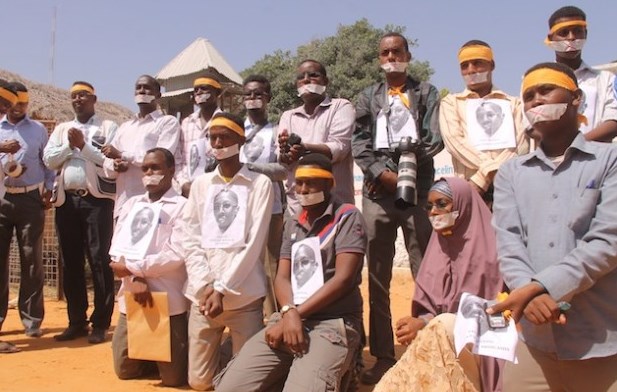
Sunday October 10, 2021

Somalia’s journalists could be bearing the brunt of broken institutions and old laws in a country where leaders have been discussing the much-missed deadlines on laws and elections.
The details emerged this week during an interactive dialogue with the Independent expert on Human Rights in Somalia, part of the continuing sessions of the UN Human Rights Council.
During the virtual side event to the UN human rights council session on Thursday, Somali journalists said their work has been hampered by archaic laws, lack of sufficient protection and a justice system that has almost ground to a halt.
“We are concerned about the deliberate targeting of vocal and brave journalists who report on uncomfortable truths, and who become targets of attacks sponsored by different actors,” said Omar Faruk Osman, the Secretary-General of the National Union of Somali Journalists (NUSOJ).
“Authorities, especially those in the Federal Member States, continue to use the old and outdated penal code of Somalia which contains vague clauses that are continually used to detain, persecute and convict journalists,” he said during a virtual session with the Independent Expert on the Situation of Human Rights in Somalia, Ms Isha Dyfan.
The side event was also addressed by British Ambassador to Somalia, Ms Kate Foster, who vowed her country's support for press freedom. Her country is the pen holder of Somalia at the UN Human Rights council and UN Security Council.
Human rights
Somalia, during the session, was commended for making some progress on human rights and media freedom including amending some laws and signing on crucial international instruments, as indicated in the Universal Periodic Review (UPR) of the Council this year.
But Ms Dyfan’s report: Situation of Human Rights in Somalia, presented during the 48th session of the Human Rights Council published this week questioned the political will to implement some of the pledges previously made to improve on media freedom and rights of people, especially women and children.
“The impact of the political stalemate on human rights has made the road to recovery even longer,” she argued in the report.
“The protracted delay in enacting human rights laws and policies and appointing members to crucial human rights institutions puts into question the political will of the
Somali authorities to advance progress in the field of human rights.”
Last year, President Mohamed Farmaajo had approved several amendments to media law, meant to protect freedoms of expression and the media.
“Unfortunately, key areas of the amended law continue to curtail freedoms of opinion and expression and constitute violations of international law as identified in the previous report….no interim measures have been put in place to address these and to protect journalists,” she argued.
Al-Shabaab militants
Both government officials and al-Shabaab militants have attacked or threatened journalists, the report argues. And according to NUSOJ, at least 33 journalists were threatened last year.
The number had reached 20 by the end of September.
Last week, Reporters Without Borders and other journalists lobbies condemned the arrest “and unwarranted detention” of Mohamed Abdiweli Tohow, a freelance journalist in central Somalia’s Galmudug region.
Mr Tohow was covering a clash between government forces and local moderate militia Ahlu Sunna Waljama’a when he was detained without charge on October 2, according to Nusoj.
Earlier this week, another journalist was detained for covering the controversial deportation of people from Somaliland to Puntland. Mowlid Ismail Diged was detained by police from the self-declared Somaliland republic as he covered the mass arrests and detentions at Las Anod town of Somalis from southern Somalia.
“On the other hand, non-state actors, buoyed by the knowledge that the criminal justice system in the country is unable to successfully investigate and prosecute the sponsors and perpetrators of attacks against journalists, have become more brazen in their attacks and harassment of journalists,” Osman told the session.
“Sustained attacks on journalists and media workers have become permanent tactics- weaponised to intimidate and gag freedom of expression in Somalia.”